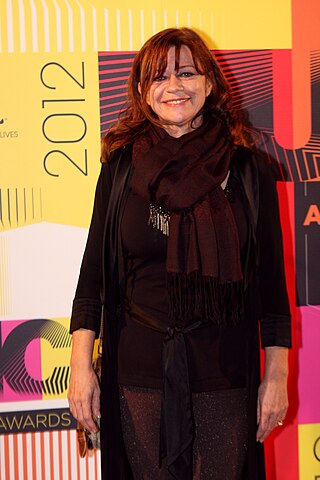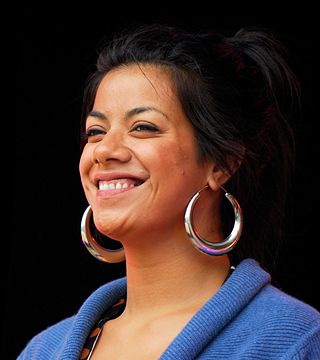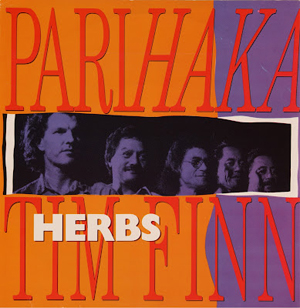
Jennifer Patricia Morris is a New Zealand-Australian singer-songwriter. Her first success came with New Zealand band the Crocodiles, who had a top 20 hit single with "Tears". Re-locating to Sydney in February 1981, she was a backing vocalist for various groups and formed a trio, QED, in 1983.
The Crocodiles were a New Zealand pop/new wave band formed in 1979 with lead singer Jenny Morris, who went on to commercial success as a solo artist in Australia; and later included drummer Barton Price, who subsequently joined Sardine v and then Models. The Crocodiles top 20 hit single in New Zealand was "Tears" in 1980 from debut album, Tears; a second album, Looking at Ourselves, appeared in November. The band relocated to Australia in February 1981 but disbanded in July without further releases.
The Front Lawn was a New Zealand musical/theatrical duo founded by Don McGlashan and Harry Sinclair in 1985. In 1989 and 1990, they were joined by actor Jennifer Ward-Lealand. The Front Lawn were known for their live performances, and toured extensively in New Zealand, Australia, Europe and America. They released two albums and made three short films.
Coconut Rough were a short-lived New Zealand pop/new wave band formed in 1982.
Fane Michael Flaws was a New Zealand musician, songwriter, director and artist.

Radio with Pictures was an early music video programme, airing on New Zealand broadcaster TV2 from 1976 to 1989. "RadPix" aired as a weekly, late night series featuring adult and alternative music.
The following events occurred in New Zealand in the year 1988.
The Exponents, formerly The Dance Exponents, is a New Zealand rock group led by vocalist and songwriter Jordan Luck.
Strawpeople are a New Zealand band. They were created by Paul Casserly and Mark Tierney after they had met while working at the Auckland university radio station now known as 95 bFM. Over the years, Strawpeople has brought together various New Zealand songwriters, vocalists and musicians in a collaborative effort and achieved some success.

Midnight Youth were a New Zealand rock band formed in 2006. Their debut album, The Brave Don't Run, was released in 2009 in New Zealand and Australia. The band subsequently toured and played festivals across Australasia, the United States and Asia. Their second and last studio album, World Comes Calling, was released in October 2011. They played their last show on 2 March 2013.

Tears is New Zealand pop group The Crocodiles's first album. Both the album and title track were released in April 1980. Both reached #17 on the New Zealand album and singles charts respectively that year. The band's second single, "Whatcha Gonna Do", however wasn't as successful, failing to chart. That year they won 'Best Group' and 'Most Promising Group' at the New Zealand Music Awards.

Karoline Fuarosa Park-Tamati, known professionally as Ladi6, is a New Zealand recording artist of Samoan descent. She spent six months living in Berlin and touring Europe in both 2010 and 2011. Her debut album Time Is Not Much debuted at number 4 on the New Zealand Top 40 Album chart. and her second album The Liberation Of... debuted at number 6 and was certified gold. Her single "Like Water" was certified platinum in June 2011. She has won many awards, including Best Female Solo Artist and Best Urban Hip Hop Album at the 2011 New Zealand Music Awards and Best Urban/Hip Hop Album at the 2009 New Zealand Music Awards. The current line-up of the wider Ladi6 group is Ladi6, her partner Parks and Julien Dyne.

"Parihaka" is a song by New Zealand singer/songwriter Tim Finn featuring Herbs, released in June 1989 from the album Tim Finn. The song reached number 6 on the New Zealand charts.

"Nature" is a 1969 single by New Zealand band The Fourmyula. The song peaked at number one in the New Zealand singles chart in 1970, won the APRA Silver Scroll songwriting award the same year, and in 2001 was voted the top song in APRA New Zealand's Top 100 New Zealand Songs of All Time. "Nature" was notably covered in 1992 by New Zealand rock band The Mutton Birds.

"In the Neighbourhood" is the 1994 debut single by the New Zealand hip hop duo Sisters Underground. The song peaked at #6 in the New Zealand singles charts and is now regarded as a landmark single both in the emerging South Auckland music scene of the 1990s and for New Zealand music as a whole.
Holidaymakers was a New Zealand musical group from Wellington. The band scored two top ten hits in New Zealand in 1988, including the number-one single "Sweet Lovers", a cover of the Bill Withers song "We Could Be Sweet Lovers".

"Can't Get Enough" is a 1994 single from New Zealand funk rock band Supergroove. It peaked at number one in the New Zealand singles chart and later charted at 36 in Australia. The song was included on Supergroove's debut album Traction. Long-time TVNZ 2 continuity announcer Warren Thomas made a spoken cameo appearance part way into the song.
Deep Obsession is a New Zealand group, notable for being the only New Zealand act to have three consecutive No.1 singles in the Official New Zealand Music Chart.
This is a list of the top 50 singles in New Zealand of 1988 as compiled by Recorded Music NZ in the end-of-year chart of the Official New Zealand Music Chart. Six singles by New Zealand artists are included on the chart, the highest being the Holidaymakers' debut single "Sweet Lovers" at No. 1.

"Kua Makona" is the debut single from Moana Maniapoto. Produced by Dalvanius Prime and sung in the Māori language, the song was used in a campaign for the Alcohol Advisory Council of New Zealand. In 1993, the song was re-recorded as a pop-reggae version entitled "Kua Makona ", released as a single by Maniapoto's group Moana & the Moahunters. This version was later included on their debut album Tahi (1993).










